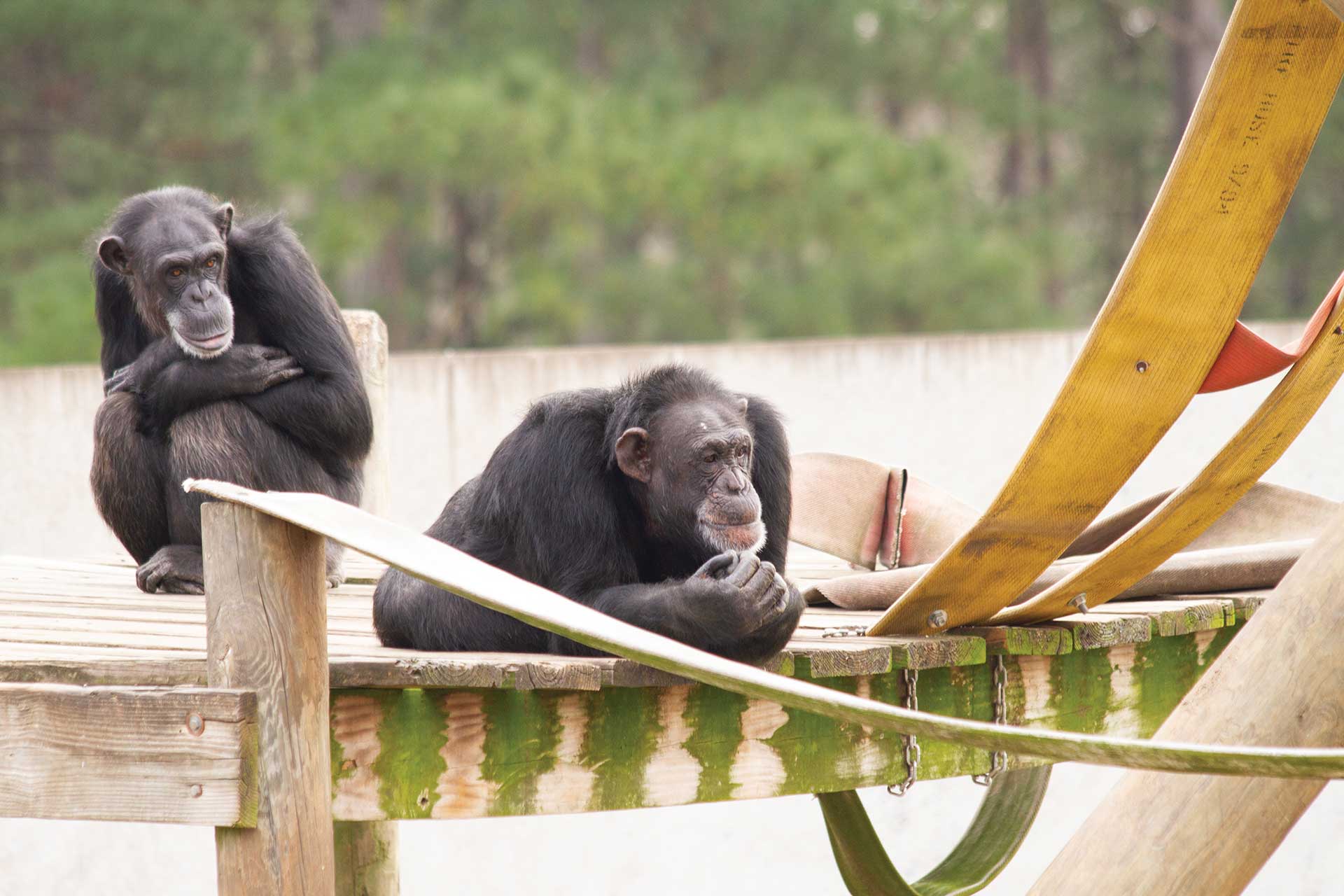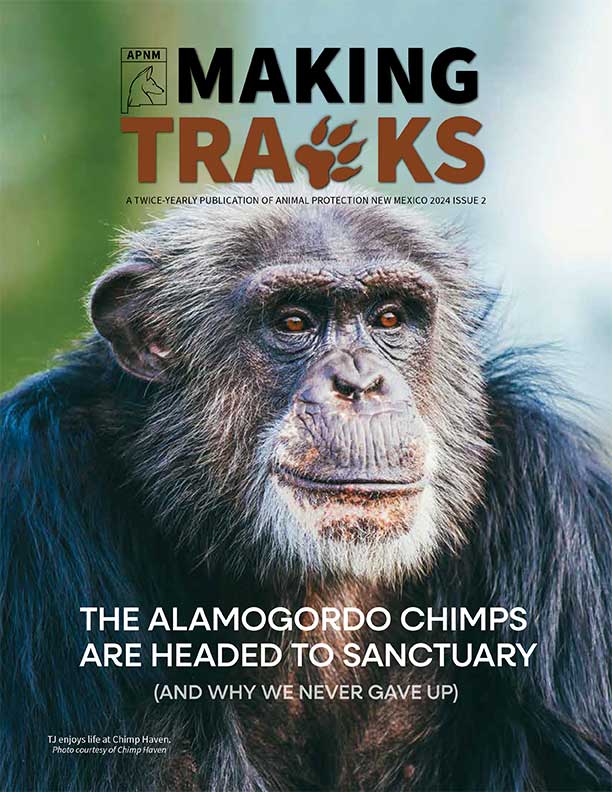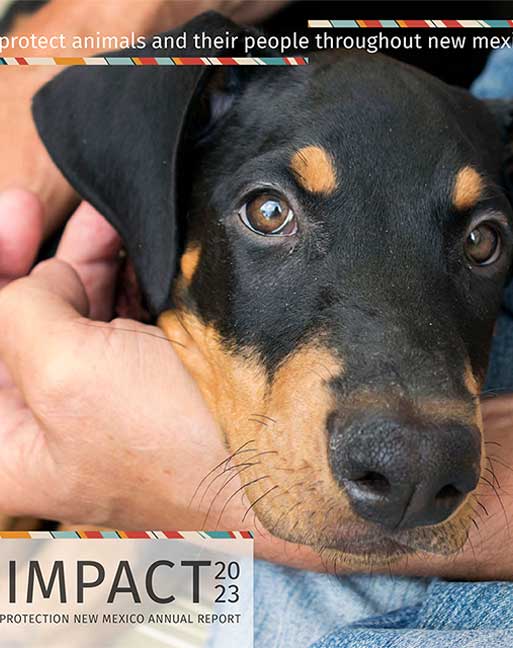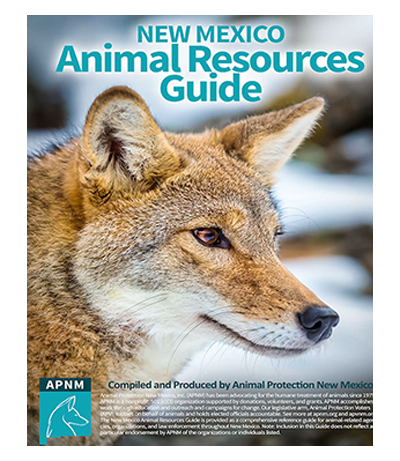In December 2022, a federal court agreed with APNM and HSUS that NIH is in violation of the CHIMP Act by refusing to transfer the APF chimpanzees to sanctuary.

Photo: (Queenie B and Barbet relaxing at Chimp Haven Photo: Jessi Princiotto/APNM)
In December 2022, a federal court agreed with APNM and HSUS that NIH is in violation of the CHIMP Act by refusing to transfer the APF chimpanzees to sanctuary. And in February 2023, the court ordered that NIH provide detailed information about each APF chimpanzee, including the order of priority of transfer of each APF chimpanzee to sanctuary, any health or safety concerns, the space available at Chimp Haven, and the status of the expansion of the sanctuary necessary to accommodate the APF chimpanzees.The lawsuit is still pending in federal court.
November 2022
Rep. Stansbury has been a champion for New Mexico’s forgotten chimps for as long as she’s been serving New Mexicans, both as a member of the NM House of Representatives in the past, and now in the U.S. House of Representatives for New Mexico.
Rep. Stansbury has led a bicameral, bipartisan letter calling on the Director of the National Institutes of Health (NIH) to facilitate the transfer of the surviving 29 chimpanzees to Chimp Haven sanctuary and held follow-up conversations with the Director of Research and other staff at the NIH. She also co-sponsored the Chimp Sanctuary Act (S 3613) to require the transfer of the Alamogordo chimpanzees living in a laboratory at Holloman Air Force Base to Chimp Haven, a lush 200-acre sanctuary. Her help has been tremendous, but the chimps are still stuck in limbo.
In addition to our lawsuit, APNM is continuing to advocate for the APF chimps via additional federal legislation. In February 2022, with leadership from New Mexico Senators Lujan (D-NM) and Heinrich (D-NM), along with Senator Kennedy (R-LA) and Senator Duckworh (D-IL), we helped with the introduction of the Chimp Sanctuary Act (S 3613) in the U.S. Senate, which, if passed, would mandate the transfer of all remaining APF chimpanzees to sanctuary within 180 days.
Additionally, for the past three years, we have made sure that NIH’s Congressional funding is contingent upon providing the members of Congress with detailed chimpanzee health reports. Read the full report on the welfare of chimpanzees at APF by Dr. Katherine Cronin, published in August, 2020.
The Bottom Line
APNM is not leaving any stone unturned in order to see all the surviving chimps reach sanctuary as soon as possible. APNM knows that not only is the chimpanzee care far superior in sanctuary, but also the cost of care to U.S. taxpayers is half what it is for housing them at APF.
At Chimp Haven, the chimpanzees live in social groups, enjoy enrichment, receive expert veterinary care, and—best of all—choose how they spend their time. The mission of Chimp Haven says it all: “to provide and promote the best care of sanctuary chimpanzees…”
While APNM’s/HSUS’s lawsuit grinds slowly through the court system, APNM continues working urgently with bipartisan members of Congress to find other ways to pressure NIH to stand by its previous commitment to retire all federally owned chimpanzees to sanctuary. We will not give up and we thank our supporters for standing with us in this challenging and protracted pursuit of justice for the surviving APF chimpanzees.
Read the full article in Making Tracks 2023 Issue 1, pages 6-8
2021: The Fight for Chimps Continues: APNM Files Lawsuit Against NIH
On January 14, 2021, Animal Protection New Mexico (APNM) joined the Humane Society of the United States and the Humane Society Legislative Fund in a lawsuit charging the National Institutes of Health (NIH) with violating federal law when it announced 44 surviving chimpanzees at the Alamogordo Primate Facility at Holloman Air Force Base (AFB) would not be sent to sanctuary.
The lawsuit argues that the NIH does not have the authority to ignore the Chimpanzee Health Improvement, Maintenance and Protection (CHIMP) Act. The CHIMP Act created Chimp Haven, the federal chimpanzee sanctuary on 200 forested acres in Louisiana, and mandates that all federally owned chimpanzees be retired there when they are no longer needed for research.
The Forgotten Chimps of Alamogordo have not been used in research for decades, yet they remain in a stark laboratory facility managed by Charles River Laboratories (CRL), an institution whose global business model is based on breeding and selling animals for invasive research. In 2008, CRL escaped serious charges of animal cruelty and neglect at their New Mexico facility by finding an absurd legal loophole in New Mexico’s laws: they were able to argue they were exempt from New Mexico’s animal cruelty statute. The charges filed against them by the 12th judicial district attorney came after two chimps died and a third chimp almost died because of specific actions taken by CRL.
At least nine chimpanzees have died—more than half of them were euthanized—since the October 2019 announcement. Meanwhile, your tax dollars are paying for these forgotten chimps to languish at a lab where their complex physical and psychological needs are not being met. In 2020 alone, the NIH wasted more than 1.2 million federal dollars warehousing chimps on Holloman AFB.
At Chimp Haven where the cost of care is three times less expensive, they can live in social groups, enjoy enrichment, receive expert veterinary care, and —best of all—choose how they spend their time.
As the lawsuit process plays out, APNM continues working urgently with bipartisan members of Congress to pressure the NIH to stand by its previous commitment to retire all federally owned chimpanzees to sanctuary.
It’s more important than ever for you to contact your members of Congress right now. We need them to speak up for the chimps and fulfill the obligation our country has to these deserving chimps, once and for all!




